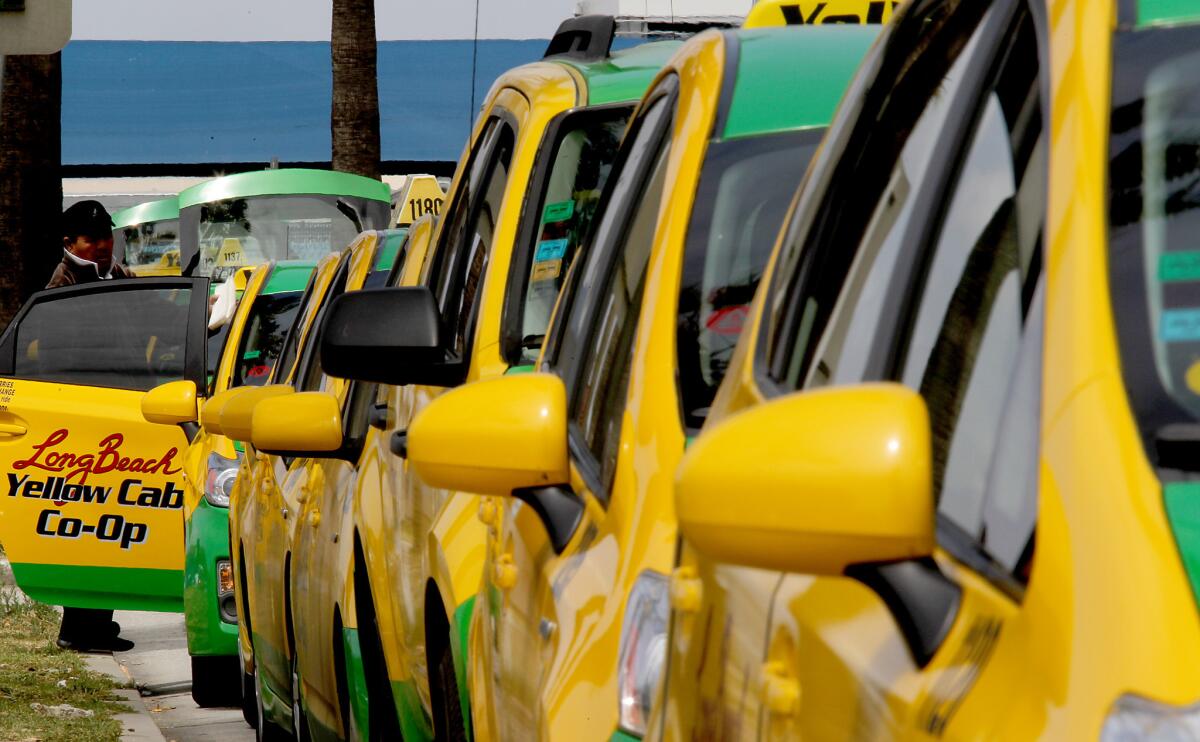Long Beach’s answer to Uber and Lyft: Cheaper taxi fares

A taxi driver cleans his cab while waiting for a fare at the Long Beach Airport.
- Share via
Long Beach officials loosened restrictions on local taxi fares Tuesday, a move aimed at keeping cabs competitive with the flexible pricing models of ride-hailing services like Uber and Lyft.
At its meeting in downtown Long Beach on Tuesday evening, the City Council voted, 9-0, to allow Long Beach Yellow Cab, which holds the city’s exclusive franchise agreement, to charge passengers less than the metered fare. The company will now be able to offer discounted rates and free rides.
The vote makes Long Beach the first major U.S. city to eliminate the price floor that prevents taxi drivers from providing free or discounted rides. The maximum price remains unchanged.
Yellow Cab officials said the shift would help its drivers better compete against Uber and Lyft. Both services set fares based on supply and demand. During periods of high demand, called “prime time” or “surge pricing,” the companies raise prices to coax more of their drivers onto the roads. Discount codes are also common.
As in most cities, taxi fees in Long Beach are set by city regulators, and do not fluctuate. Cabs charge a base fare of $2.85, plus $2.70 per mile. The policies were put in place to protect customers years ago, officials say — before Uber and Lyft existed.
“Taxicabs have had no opportunity to experiment and fail, or experiment and succeed,” said William Rouse, the general manager of Long Beach Yellow Cab Cooperative Inc. “We as an industry find ourselves the reluctant participants in one of the great public policy debates that is going on today.”
The city also approved the addition of 24 new taxis to the fleet, bringing the total to 199, and OK’d a proposed rebranding for Yellow Cab with a new name (Yellow Long Beach), a slightly quirkier logo, and a mobile app called Ride Yellow.
Helping taxis stay competitive is not a knock on Uber and Lyft, but a way to protect a “community partner” that provides an important service for tourists, the elderly and the disabled, Long Beach Mayor Robert Garcia said at the meeting.
Lower prices and coupons for free rides should help bring demand for taxi service back up, Rouse said. In the last year, Long Beach’s 175 licensed taxis have seen “less than a 15% decline” in business, he said.
“Most people know it’s illegal for drivers to charge more than the meter, but it’s just as illegal to charge less than the meter,” Rouse told the Los Angeles Times. “For a long, long time, we’ve known there’s been a need to address this imbalance.”
Other U.S. cities, including Chicago and Seattle, have moved to impose regulations on ride-hailing companies, requiring driver training, insurance policies and vehicle inspections.
In Los Angeles, city officials will soon require all 2,361 licensed taxicabs to use an app that works much like the Uber and Lyft apps, but they are not currently considering a change to the taxi rate structure.
L.A.’s nine licensed cab companies reported a 21% drop in trips in the first half of 2014 compared with the same period the previous year, the steepest decline on record.
For more Los Angeles transportation news, follow @laura_nelson on Twitter.
More to Read
Sign up for Essential California
The most important California stories and recommendations in your inbox every morning.
You may occasionally receive promotional content from the Los Angeles Times.











